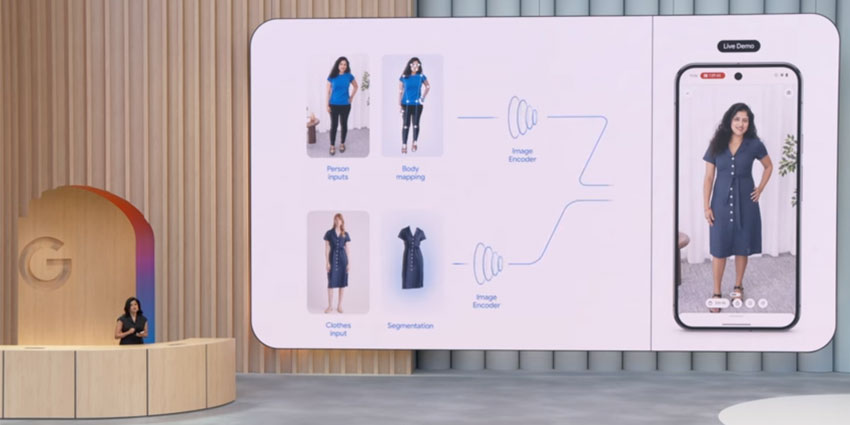Google demoed a new online shopping experience during its annual developer conference: Google I/O.
In doing so, it introduced virtual try-ons, price tracking, and an agentic checkout, with the latter threatening to kill the checkout page.
As an important prelude, Google first announced a new search experience that is now available in the US.
“AI Mode in Google Search” is a more conversational approach to search, which provides AI-generated answers to long, complex queries.
According to the company, it can also offer “helpful, personalized” suggestions based on a user’s past searches.
Yet, the new Google Search doesn’t only answer questions; it completes tasks, including those related to commerce.
The New Google Search Shopping Experience
AI Mode pulls in information from the web and Google’s real-time data.
As such, Google can bring together Images and its Shopping Graph, which has over 50 billion product listings that it constantly updates.
That combination allows users to type the details of a product they’re looking for into AI Mode. The search function then presents a browsable mosaic of images and shoppable products.
Users can then refine their search, browse recommendations, and ask AI Mode questions about a product.
That product may be an item of clothing. In this scenario, Google offers a “try-on” feature that will help users virtually try on clothes to get a feel for how styles might look on them.
In doing so, they can lay the product over a picture of themselves, thanks to a custom image generation model, as pictured below.

Introducing the feature, Vidhya Srinivasan, VP & GM of Ads and Commerce at Google, explained: “The try-on feature uses body mapping from the image itself to aid in the accuracy of the item of clothing and the person. This technology is the most state of the art at scale feature of its kind.”
Now that the customer has found something they like, AI Mode helps the consumer find the best price and buy it with a new, agentic checkout feature.
All this, directly in Google search results.
Yet, perhaps the customer wants it cheaper. In this case, they can set an alert, so Google continuously checks websites where the product is available and lets the user know if the price drops.
When that happens, they get a notification – via Google Shopping – on their smartphone. If they wish to buy, a checkout agent will add the right size and color to their cart.
“I can choose to review all my payment and shipping information, or just let the agent buy it for me,” concluded Srinivasan.
Interestingly, Amazon added a similar checkout feature to its app earlier this year. Yet, Google’s announcement could have much bigger consequences for the future of payments, commerce, and retail.
Google Has Nuked the Checkout Page – Fintech CEO’s to go to DEFCON One?
Announcements such as this point towards the seismic shifts in the commerce and payment industry.
Indeed, Google is not alone in reinventing the shopping experience, with major fintech players moving rapidly to embed AI-powered transactions into daily commerce.
After announcing shopping on ChatGPT, OpenAI has brought in Instacart CEO Fidji Simo to lead consumer operations, while Perplexity has integrated Stripe into its chatbot.
Meanwhile, Visa, Mastercard, and PayPal announced their own agentic commerce services in April.
The battle for who controls the critical moments before, during, and after payment has begun.
Making this point, Simon Taylor, Head of Strategy & Content at Sardine, posted on LinkedIn:
For decades, merchants optimized checkout pages for conversion: A/B tests on button colors, reducing form fields, one-click purchasing, c art abandonment emails Now Google’s agentic checkout could make all that irrelevant.
The implications are clear: whichever platform perfects agentic commerce first will likely shape the next decade of commerce.
With AI poised to redefine how transactions happen, fintech companies must adapt – or risk becoming obsolete in a world where AI doesn’t just assist in payments, but actively executes them.







